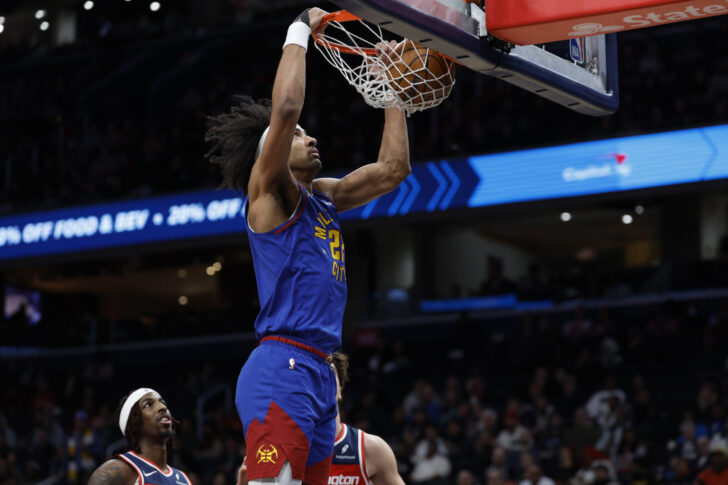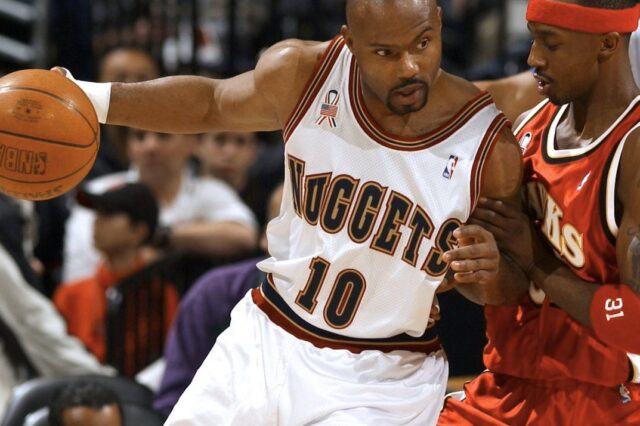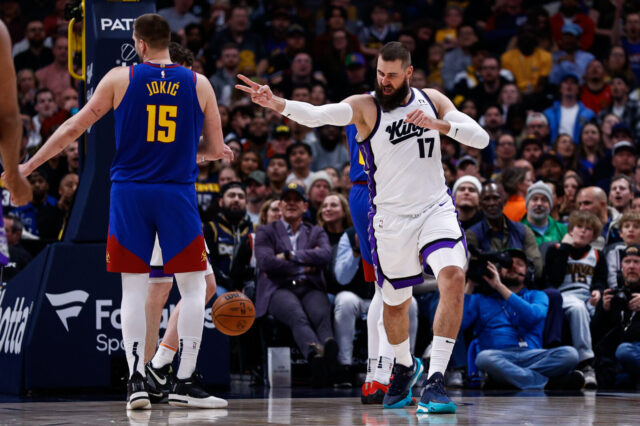I’m back at Stiffs which means the annual Denver Nuggets trade value power rankings are back at Stiffs as well. If you’re not familiar, we go through each of the Denver Nuggets tradeable pieces and rank them in terms of what I believe to be their relative value on the market. It is always important to remember that these rankings are not intended to be a commentary on who is the better player, who is more valuable to their team or who is performing the best. While some of these aspects certainly can and do affect a player’s trade value, the rankings below are strictly based on value in the trade market which can be altered by a myriad of things beyond ability, fit and performance. *Note: because of the Stepien Rule and previous trades Denver has made, they cannot trade any first round picks this season.
No value whatsoever
Zeke Nnaji
Zeke starts off our rankings as the player/pick/coach with the least amount of trade value. This is due almost entirely to Zeke getting an extension this year. That causes a unique trade provision to go into effect. Anytime a player signs an extension with his team then if he is traded the amount his salary counts against the cap is altered, depending on whether it’s the team receiving the player in the trade or sending him. The team sending the player counts that player’s salary in the deal like any other player, his contract value in the trade is whatever the annual value of his contract is. However, for the team receiving the player in question, his salary is counted as the average annual salary between the remaining year on his original contract and all the years on his extension. So why does this make Zeke virtually untradeable? Another rule for NBA trades is if a team is over the salary cap then they cannot take on more than 25% additional salary in comparison to the player they are sending out (or less depending on some other rules but we don’t have time to dive into tax aprons on this article). For all intents and purposes, if a team is over the cap they can’t receive more salary in return than what they send out. Currently, 28 of the 30 teams in the NBA are over the salary cap so every team outside of the Detroit Pistons & Utah Jazz are bound to this rule.
So why does that matter for Zeke? His current salary is just over $4 million, but he signed a 4 year extension worth $32 million (or $8 million annually), if you average the annual value of his four extension years and the value of the remaining year on his current contract you get around $7.25 million. So going back to the rule regarding trading players who just signed extensions (aka the Poison Pill Provision), while the Nuggets would send out Zeke and count his contract value at $4.3 million, whoever acquired him would have to count him as $7.25 million for the purposes of the trade. Because that team is over the cap, they have to send out $7.25 million in the trade but because the Nuggets are also over the cap, they can only take back $4.3 million in a trade…and thus we are at an impasse. Even if you go back to the Pistons and Jazz, neither team is more than $2.5 million under the cap so even they would not be able to absorb the approximately $3 million difference in trade contract value. On top of all that long winded explanation about NBA cap rules that you’re sure to now excitedly explain to your significant other, Zeke’s play this season has not been able to warrant him a regular rotation spot so even if we could get past the rule quirks his value will still be very low because right now it’s a tough sell to convince a team to take on $32 million+ of total salary for a player currently rocking a BPM this season of -5. Yikes.
Ya gotta trade something
Pick Swaps
Izzet Turkyilmaz
Cash
Vlatko Cancar
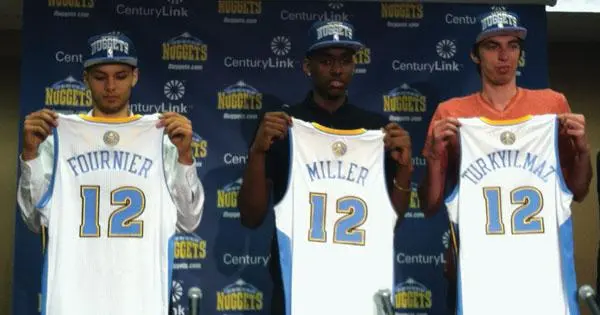
I remember getting a chance to watch Izzet live and in person as a draft and stash prospect…in 2015…at an open practice in preseason. I believe that was the last time he was stateside doing something basketball related with the Nuggets. A second round pick in 2012, he never made it to the NBA and never signed an NBA contract so the Nuggets still own his draft rights. They technically own draft rights still to Xue Yuyang and Sani Becirovic as well, but in order to trade one of these stashed “prospects” they have to still have a legitimate chance of playing in the NBA. Now, the word legitimate is open to interpretation but Xue and Sani are in their 40s and officially retired, nobody in the league office is signing off on that. At 33 years old Turkyilmaz is still playing professionally in the Turkey Basketball League and while he almost assuredly will never see an NBA floor the league themselves is not going to make that determination for a team at this point. So why hang onto his rights if you’re the Nuggets?
Another rule for NBA trades is you can’t receive something in a trade while simultaneously giving nothing. As the header for this tier says, ya gotta trade something. If the Nuggets were in a position to take on salary dumps from other teams (they are not) then Turkyilmaz is one of the players they could trade. Another option would be cold hard cash. Arguably I’ve rated the greenbacks a bit too low here. Technically the Nuggets could trade up to $7 million in cash because they have not reached the second tax apron (look, just trust me, I’m already 900 words in. We really don’t have time to get into all that). That’s a fair chunk of change. Now, given the large salary bill they are already paying there’s about zero chance of that happening (among other reasons) but they could trade as little as $110k. Of course, to trade cash, and not a player, and receive a player in return the Nuggets would have to have space, both roster and cap, and they have neither so the cash is also a fairly limited trade asset in Denver’s arsenal.
Finally we have the conundrum of Vlatko Cancar who is out for the season for injury but is also Nikola Jokic’s BFF on the team. Vlatko’s value to Denver this year is immensely higher than any other team (save for maybe the Dallas Mavericks who likewise probably see the value in having Luka Doncic’s compatriot around even if he can’t play). From a strictly trade perspective Vlatko has a small contract ($2.2 million annually) with a team option for next year so in theory if a team was looking to get off a longer term contract they might take Vlatko in return for the salary match knowing they can terminate his contract at the end of the season…but who is this mystery player on a sub $3 million annually multi-year contract that a team is trying to get off of? Doesn’t really exist, so while perhaps Vlatko’s value is slightly more than Izzet or straight cash homie, its not that much more.
As for the pick swaps, with Denver being the reigning champs a pick swap is generally going to be useless to whatever team trades for it as the probability of Denver picking lower than them in the draft is very high. However, you don’t have to use a pick swap if you don’t want to so it could once again be a scenario of trading something just because you have to trade something.
The throw ins
Jay Huff
Braxton Key
Ismael Kamagate
Colin Gillespie
Any of Denver’s second round picks.
Alright, we’re into the guys who teams might actually see value in beyond just having to trade for something (or being impossible to trade like Zeke). Huff, Key and Gillespie are players on two-way contracts while Kamagate is another draft and stash guy but he’s still young with plenty of upside and actually could end up in the NBA someday, perhaps even sooner rather than later. Huff and Key have bounced around the league a bit and fair or not guys who are on their third and fourth years respectively still trying to make it in the league don’t have much appeal to other teams. Gillespie on the other hand was drafted last season and sat out the entire year with injury so he is considered a rookie. He’s also getting a little buzz with being named to the G-League All Star team. Put it all together and he’s the prospect in this tier with the highest floor while Kamagate probably has the highest ceiling. Any of these four guys could be valued by another team based on their fit and what scouts see as strengths still yet to be maximized but it’s unlikely for a trade to be a one player for one player type of deal. If a team is interested in one of these guys they’re far more likely to get them added into a larger deal. Same goes for the second round picks. They often get traded as sweeteners to move bad but not terrible contracts or end up being offered as conditional picks that are traded for other cap mechanisms (see: Hibbert, Roy). Teams always prefer to pick their guy over taking someone else’s guy so that’s why the 2nd rounders rank the highest in this tier.
Low minute contributors in the right situation
DeAndre Jordan
Justin Holiday
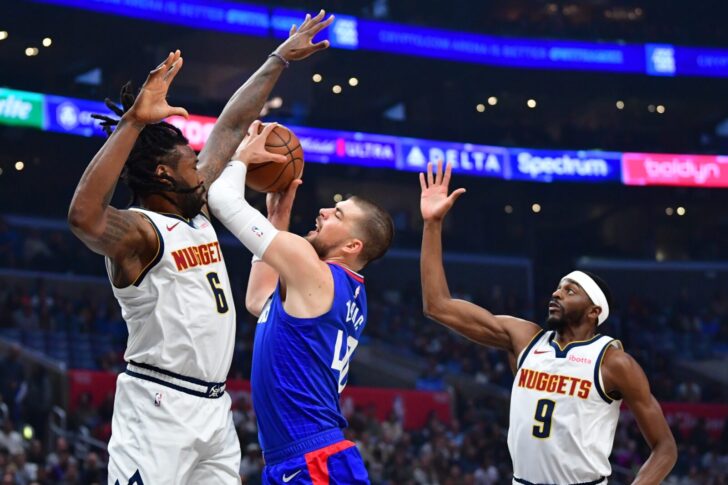
Nov 27, 2023; Los Angeles, California, USA; Los Angeles Clippers center Ivica Zubac (40) moves to the basket against Denver Nuggets center DeAndre Jordan (6) and forward Justin Holiday (9) during the first half at Crypto.com Arena. Mandatory Credit: Gary A. Vasquez-USA TODAY Sports
We’ve seen both Jordan and Holiday have a positive impact on the team when they get minutes, and we’ve seen some of their limitations too. These are guys who aren’t going to fit every roster and often times end up piling up the DNP-CDs if the fit is bad. For the Nuggets, Jordan fits a role as a roller who gives them size down low. He’s actually a bit of an anomaly these days as a true 5 off the bench and probably only would see minutes on a handful of rosters. Holiday meanwhile has been depth, generally being the first name called to fill in if someone is out with injury. Players like this have value on the trade market, but it is small. To their benefit (at least in terms of trade value) neither guy is carrying a big contract. They are the type of players who have small enough deals that if a team felt they were a good fit they might offer a 2nd round pick or one of our “Ya Gotta Trade Something” tier, but by and large their value is very minimal. If they were on larger contracts it would be virtually none as teams would anticipate being able to add players like that in the buyout market at a much cheaper price (exactly what Denver did with Reggie Jackson last season).
Maybe you missed him in the draft
Hunter Tyson
Jalen Pickett
Denver’s duo of second round rookies offers slightly more value than the guys in the “low minute contributors” tier. This is all based on potential of course. Holiday and Jordan are in their 30s and are what they are in the NBA but while they get more minutes than Tyson and Pickett, the two rookies have the chance to blossom into something better given time and the right development. Both have spent a large amount of time working on their game in the G-League this season so they are unlikely to be jumping off the page in any GMs trade primer right now. However, being that they are rookies, the scouting reports that teams were doing on them this past summer are still fresh and if a team feels like they missed out on one of these guys they could in theory try to pluck one of them now. This is also a case though where value to the Nuggets is higher than value to other teams. Denver has made no secret about their strategy of drafting older, ready to contribute rookies as a way of managing their cap and maintaining competitiveness. That’s likely to be more valuable to them than whatever they would get offered for Jalen or Hunter.
Solid bench players
Reggie Jackson
Big Government in a tier of his own. Denver’s roster construction is a bit unique in that it’s Jackson and a bunch of young guys who are making up the majority of the bench rotation. Whereas most teams would have two or three veteran contributors off the bench, Jackson stands alone in this tier on the Nuggets. A player who was bought-out last season, Jackson came back to Denver this season on an affordable contract and has proven to be an effective sixth man. He filled in admirably for a month as a starter for Jamal Murray and has in some ways had a career resurgence in Denver this season. These types of players are often coveted at the deadline by contending teams. These teams likely already have their core in place and are looking to supplement it with veterans who can be a stabling force on the court and in the locker room. Reggie fits this description to a tee. However, once again his value to the Nuggets is likely higher than what they could get for him. Players in this tier don’t often earn 1st round pick compensation but for someone who is as vital to Denver’s rotation as Reggie, it would take an offer like that or someone offering an upgrade over Reggie to motivate Denver to do a deal.
Prospects blossoming into NBA players
Julian Strawther
Christian Braun
Peyton Watson
We’re straying into the first round pick compensation area, though for Denver’s trio of prospects they might not yet garner such return in a trade. These guys are the up and comers though, not billed as stars but all three have shown how they can help a contender’s rotation. Additionally, with their affordable contracts and high ceilings, they can be valued players to rebuilding teams as well who see an opportunity to add a piece to the puzzle. That being said, these players usually end up in star trades. If the Nuggets were going to trade Kentavious Caldwell-Pope to try and land a star upgrade at the shooting guard position for example, one or multiple of Braun, Watson and Strawther would likely be in that deal as well. These low cost, high upside guys are what a team who is about to enter a rebuild are most likely to desire along with straight up draft picks.
Championship coach
Michael Malone
It’s rare for a coach to get traded but it is possible. The best example we have is probably Doc Rivers being traded by the Boston Celtics to the Los Angeles Clippers. Rivers had recently won an NBA championship in Boston and was considered a marquee coach in the NBA. Michael Malone finds himself in a similar situation in present day. The return for Rivers was a first round pick so it’s reasonable to assume Malone would garner the same. The difference is that Celtics team was aging out. They were looking to move on from the trio of Paul Pierce, Kevin Garnett and Ray Allen (Allen was already gone) and rebuild. Doc was one of the highest paid coaches in the league at the time so it didn’t make much sense from Boston’s end to pay that much for a coach of a rebuild, nor did it make sense for Doc as a championship coach to want to coach through a rebuild. The Nuggets are not looking to get off their core anytime soon so while Malone is one of their most valuable trade assets, they’re extremely unlikely to even consider moving him.
If you’re offering a superstar upgrade then sure but otherwise don’t bother
Kentavious Caldwell-Pope
Michael Porter Jr.
Aaron Gordon
We’ve reached the starting lineup. The Nuggets have carefully curated this group over several seasons and watched it ultimately bear fruit last season when KCP proved to be the final piece the lineup needed. With Pope being the oldest member of the group at 30, there’s still plenty of meat left on the proverbial championship bone for this group to get. That puts Denver in the unique situation of really not looking for any significant pieces or upgrades at the deadline. They already have proof of concept with this group so to get them to move off of one would take an over the top deal. If the Los Angeles Clippers wanted to trade Kawhi Leonard for a package of Michael Porter Jr and some of Denver’s blossoming prospects then of course they’d have to consider that deeply. The Clippers aren’t offering that though and no one is. It would be very hard for Denver to justify trading any of these guys without a clear upgrade coming back to them. Generally speaking these guys are traded for mid-level player/pick packages. We can in fact use two players in this tier as examples. KCP took two playoff rotation players, Will Barton and Monte Morris, to acquire. Gordon took a playoff rotation starter (Gary Harris), a young prospect (R.J. Hampton) and a 1st round pick to acquire. Moral of the story is you can get a decent package for a player like these guys, but whether Denver would get a player to improve their standing as a championship contender right now is far less likely.
There’s nothing you can offer, he’s ours
Jamal Murray
Nikola Jokic
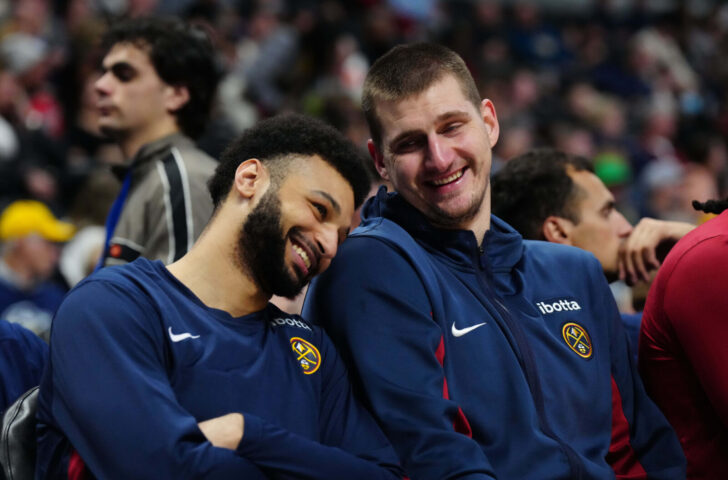
Dec 28, 2023; Denver, Colorado, USA; Denver Nuggets center Nikola Jokic (15) and guard Jamal Murray (27) react on the bench during the fourth quarter against the Memphis Grizzlies at Ball Arena. Mandatory Credit: Ron Chenoy-USA TODAY Sports
We’ve reached the point of the most valuable players on the roster. Both Jokic and Murray would get superstar returns if Denver was to make them available. We’re talking multiple first round picks plus prospects. Consider the package the Minnesota Timberwolves traded for Rudy Gobert (4 – 1st round picks, a 1st round rookie, a 1st round pick swap, multiple rotation level players) and consider he is nowhere close to the level of Jokic’s play. It’s almost difficult to fathom what the return for Jokic would be in a trade but it would start around 5 first round picks plus prospects. There is likely not a more valuable trade piece in the entire NBA than Joker. Luckily for us as Denver fans, both Jamal and Nikola are quite content to stay in Denver and in the middle of their championship winning primes so Calvin Booth can simply give a polite “no thank you” and hang up the phone to any team that calls in inquire about either.
